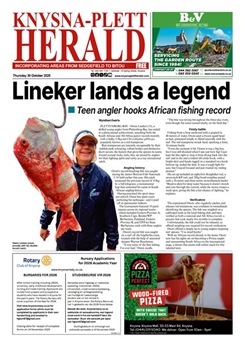PLETTENBERG BAY NEWS - The rough sea conditions over the past week have brought interesting, but dangerous visitors to Plettenberg Bay beaches including the highly venomous yellow-bellied sea snake.
Two of these pelagic snakes, mostly found in tropical waters around the world, have washed up on Plett beaches over the past week.
Experts have warned beachgoers not to handle these snakes as, although bites are rare, they can deliver a highly venomous neurotoxin that can be lethal.
CapeNature senior field marine ranger Chanel Hauvette said the two snakes found along Plett beaches had been successfully rescued by local snake experts and were currently being stabilised and nurtured back to health in a local aquarium.
"Once sea conditions have improved and the snakes are in good condition to be released, we will take them out to sea where conditions are favourable and release them back into the wild," Hauvette said.
Unusual to be found along Garden Route coast
She added that it was very unusual for these snakes to be found along the Garden Route coast as they were usually found in warmer tropical waters.
Hauvette said that the rough seas likely took the snakes out of warmer currents into colder waters, leaving them hypothermic and that subsequently led to them washing up locally.
Dr Werner Conradie, the curator of herpetology at Bayworld in Gqeberha who has been advising the Plettenberg Bay Stranding Network on the situation, said that these snakes usually washed up dead or nearly dead.
"The two from Plett are currently still alive, which is unusual, but we have no way of knowing what will happen once we return them to the ocean," Conradie said.
Among the rescuers were snake experts and locals Lloyd Mostert and Tiago Robelo. Mostert said that when these snakes washed up they were unable to move, but that it was not an invitation to handle them.
"They are highly venomous with no anti-venom (in South Africa)," Mostert said. He advised anyone who comes across a snake on the beach to contact the Plett Stranding Network hotline on 079 463 4837.
Hauvette said that the snakes were not only washing up locally, but also along the Eastern Cape coast and that about four had been discovered over the past week.
Yellow-bellied sea snakes can be easily identified due to their unique features. The upper half of the body is black to dark blue-brown in colour, with a yellowish lower half.
‘We bring you the latest Garden Route, Hessequa, Karoo news’
















